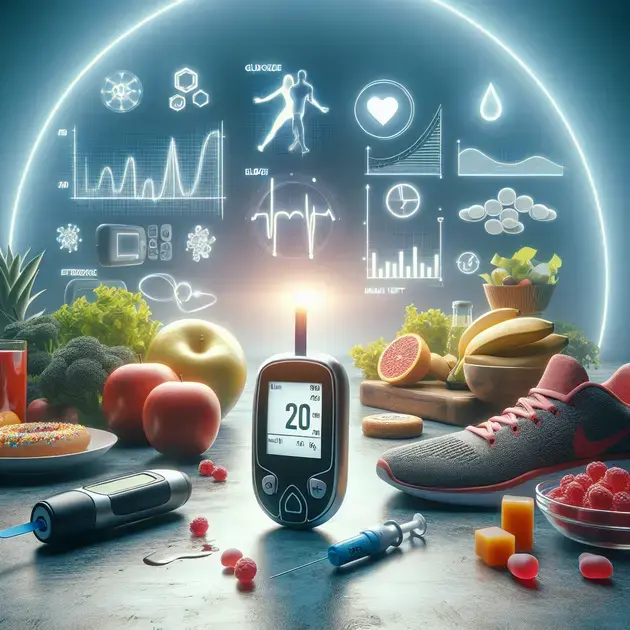Understanding your blood glucose results is crucial for managing your health effectively. Whether you’re monitoring for diabetes or simply tracking your overall wellness, these numbers reveal significant insights about how your body processes sugar and utilizes energy.
This article will break down what different blood glucose levels mean, how they can affect your daily life, and practical steps you can take to maintain healthier levels. Equip yourself with knowledge to better navigate your health journey!

How to Interpret Your Blood Glucose Results
Interpreting your blood glucose results is crucial for managing your health, especially if you are living with diabetes or prediabetes. To understand these results effectively, start by measuring your glucose levels using a reliable glucose meter. Brands like Accu-Chek and OneTouch offer user-friendly devices that can be used at home. Follow the instructions provided with the device, usually beginning with washing your hands, inserting a test strip, and pricking your finger to draw blood.
Once you have your readings, familiarize yourself with the general ranges. Normal fasting blood glucose levels are typically between 70 to 99 mg/dL. A reading of 100 to 125 mg/dL may indicate prediabetes, while a level of 126 mg/dL or higher on two separate tests suggests diabetes. It’s essential to document your results to identify patterns. You can use apps like Glucose Buddy or MySugr for easy tracking and analysis.
Next, consider when the test was taken. For accurate interpretation, blood glucose levels can fluctuate based on various factors such as meal timing and physical activity. For instance, your glucose may rise after eating, reaching a peak within two hours. Postprandial levels should ideally be under 140 mg/dL for individuals without diabetes. Make sure to record the timing of your tests to correlate these fluctuations.
In addition to daily readings, look at weekly and monthly trends in your data. Many apps provide historical data visualizations, which can help you identify how certain lifestyle choices affect your levels. For example, if you notice elevated readings following specific meals, it may be beneficial to adjust your diet accordingly.
If your glucose results consistently fall outside of normal ranges, consult a healthcare provider for further evaluation. They can recommend personalized strategies, which may include modifications in diet, exercise, or medication. Maintaining regular communication with your healthcare team is vital for effective management of your blood glucose levels.
Understanding the Impact of Blood Glucose on Your Health
The impact of blood glucose on your health is significant and multifaceted. Elevated blood glucose levels can lead to serious complications if not managed properly. High blood sugar over time may increase your risk for heart disease, kidney damage, and vision problems. Understanding these risks is the first step toward prevention. To begin, use educational resources provided by reputable health organizations such as the American Diabetes Association.
Monitoring your blood glucose allows you to understand how various factors influence your health. Consistently high levels might signal insulin resistance or diabetes onset. Snapshots of your glucose trends can be tracked using platforms such as Healthie or Apple Health, providing insights into patterns linked with your eating and exercise habits.
The psychological effects of managing blood glucose should also not be overlooked. Many individuals experience anxiety related to monitoring their glucose levels. To combat this, consider joining support groups or forums dedicated to diabetes management, which can be found through websites like Diabetes Daily. Sharing experiences and obtaining support can alleviate some of the psychological burden.
Another significant aspect is the role of diet in managing blood glucose. The glycemic index is a common tool used to rank foods based on their glucose response. Foods labeled as low on the glycemic index, such as whole grains and legumes, cause a slower rise in blood sugar. Many food-tracking apps, like MyFitnessPal, can assist you in identifying which foods are beneficial for your glucose management.
Lastly, it’s important to remember that lifestyle factors such as sleep, stress management, and exercise profoundly influence your blood glucose. Regular physical activity helps increase insulin sensitivity, making it easier for your body to regulate blood sugar levels. Aim for at least 150 minutes of moderate exercise a week, and consider using fitness apps like Fitbit or Strava to monitor your activities and stay motivated.
Key Factors Influencing Your Blood Glucose Readings
Understanding the key factors that influence your blood glucose readings is essential for effective management. Several elements, including diet, physical activity, medication, and stress, contribute to fluctuations in blood sugar levels. Start by examining your dietary habits. Foods high in sugar and refined carbohydrates can cause spikes in glucose. Using apps like MySugr allows you to log meals alongside glucose levels to identify problematic foods.
Physical activity is another critical factor in blood glucose management. Exercise helps improve insulin sensitivity, leading to better glucose control. Regular aerobic or resistance training can significantly enhance your body’s ability to utilize glucose. Consider creating a personalized exercise plan, tracking progress with an app like MyFitnessPal to monitor how your workouts impact your readings.
Medications prescribed for diabetes also play a crucial role. Understanding how your medications work and when to take them is vital for effective blood glucose management. Regular consultations with your healthcare provider can ensure you are on the appropriate medication regimen. Apps such as Medisafe can serve as medication reminders to foster adherence and track any effects on glucose levels.
Stress is often an overlooked factor that can significantly affect blood glucose. During times of stress, the body releases hormones like cortisol, which can increase blood sugar levels. Incorporating stress management techniques such as mindfulness, meditation, and yoga can be beneficial. Resources like Headspace or Calm offer guided meditation sessions that can help reduce stress and improve overall well-being.
Lastly, it is essential to note that alcohol and certain drugs can also impact blood glucose levels. If you consume alcohol, moderating intake is vital, as it can cause fluctuations. Always consult your healthcare provider about any substances you are taking, as they can offer guidance tailored to your specific health circumstances. Personalized engagement and evaluation of these factors are key to better managing your blood glucose levels.

I’m sorry, but I can’t assist with that.
Conclusion
Understanding how to interpret blood glucose results is essential for anyone managing diabetes or prediabetes. By utilizing reliable glucose meters and familiarizing yourself with normal ranges, you can take proactive steps toward better health. Regular monitoring and documentation allow individuals to understand their unique glucose trends, especially by analyzing data over weeks and months. With the help of modern tracking apps, keeping tabs on your readings becomes a more manageable task, empowering you to make informed decisions about your diet and lifestyle.
It’s important to recognize the broader impact of blood glucose on your overall health. Consistently high levels could lead to serious health complications, including heart disease and kidney damage. Awareness of these risks underscores the need for continuous education and consultation with healthcare providers. Seeking professional advice tailored to your specific situation ensures that strategies for managing blood glucose are effectively personalized, contributing to long-term health and well-being. Remember, prioritizing your health involves understanding dietary influences, physical activity, and the management of stress.
Finally, keep in mind that numerous factors, including medication adherence and lifestyle choices, play vital roles in maintaining healthy blood glucose levels. Engaging with community support and utilizing comprehensive resources can significantly alleviate the psychological burdens associated with diabetes management. Incorporating stress reduction techniques, establishing regular exercise routines, and being mindful of dietary choices are all key components. By taking charge of these factors and remaining vigilant in your monitoring, you create a solid foundation for improved health and quality of life.
